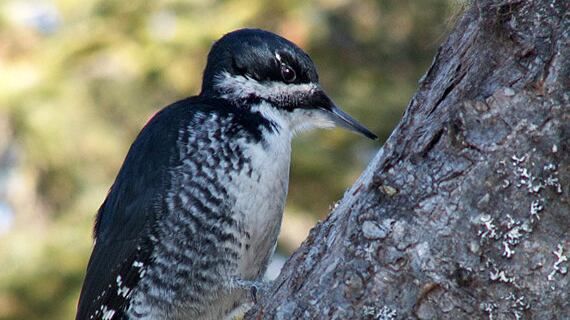Yesterday, the federal government quietly denied protections to 25 species scientists have found to be imperiled.
In a memo from the U.S. Fish and Wildlife Service (FWS), the department declined 25 petitions to list 25 species under the Endangered Species Act, including the black-backed woodpecker, which is found in Oregon, California and South Dakota.
But according to the Center for Biological Diversity, the FWS's claims are "bogus" and Oregon's black-backed woodpecker, along with the other 24 other species will continue to be imperiled as a result of the decision.
"This is a truly dark day for America's imperiled wildlife. You couldn't ask for a clearer sign that the Trump administration puts corporate profits ahead of protecting endangered species," said Noah Greenwald, endangered species director at the Center for Biological Diversity in a press release.
There is not yet an appointed director of the FWS, but it is an agency under the Department of the Interior, whose secretary is directly appointed by President Donald J. Trump. That current secretary is Ryan Zinke, a University of Oregon graduate. The acting director of the FWS is Greg Sheehan, an avid hunter.
Zinke has been under criticism this week after Joel Clement, a federal scientist, was reassigned for warning Alaska natives about the dangers of climate change. Clement resigned and wrote a letter, where he accused the Trump administration of silencing scientists:
He continues:
"It's a marked change from the Obama administration; it hearkens back to the Bush administration, which was also very anti-protection for endangered species," Greenwald tells WW.
For example, in 2011, the Obama administration determined that the Pacific walrus warrants protection, Greenwald says. They didn't have the resources to provide that protection, so they instead put it on a candidate list, but the Trump administration has reverted course.
"It's pretty ridiculous. We know that walrus need sea ice to nurse their young and to forage and the reversal the Trump administration issued is basically saying, 'hopefully they'll adapt to the land,'" Greenwald says.
The FWS determined that the Black Hills, South Dakota population and the Oregon Cascades/California populations of the black-backed woodpecker aren't distinctive enough to be considered two separate species.
But the Center for Biological Diversity petitioned for the inclusion of the black-backed woodpeckers because the two populations are small and isolated from each other. The woodpecker is also endangered due to its dependence on burned forest.
"The woodpeckers depend on burned trees specifically, so salvage logging and fire suppression has really impacted those guys. It goes to show that fire is a natural part of a forest; it's something that happens and there are some species like black-backed woodpeckers that specifically depend on it," Greenwald says. "There's not as much of that habitat type of burned forest as there used to be."
What's particularly troubling, as noted by Greenwald, as well the Washington Post, are species whose habitats are threatened by climate change specifically.
The petition to list the Pacific walrus was denied, despite the species facing increased endangerment from the global warming of its Arctic habitat. The Florida Keys mole skink was also denied, a reptile species whose beach habitat just faced massive destruction due to Hurricane Irma, according to the Washington Post. According to the Center for Biological Diversity, FWS acknowledged the mole skink "will lose half its range by 2040 to sea-level rise," but still denied protection.
Greenwald says the USFWS has a backlog of over 500 species waiting for decisions on their protection. In just 2017 alone, the agency has committed to making decisions on 62 species. So far, they've denied protection to 29, and have given protection to 10. They'll need to make decisions on the remaining 23 species before the end of the year.
Now, Greenwald says the only option for the Center for Biological Diversity is to go to court to challenge the negative findings. They'll need to evaluate on a case-by-case basis which ones they can challenge.
Greenwald says they might challenge the black-backed woodpecker, but they'll definitely challenge the walrus.
"My scientists believe we're in an extinction crisis," Greenwald says. "We should all be concerned about extinction because we depend on a lot of the same things: clean air and clean water. To lose more species, we should expect to see a decline in the quality of our own life. It's really disconcerting to see the Trump administration deny protection to species that so clearly need it."
